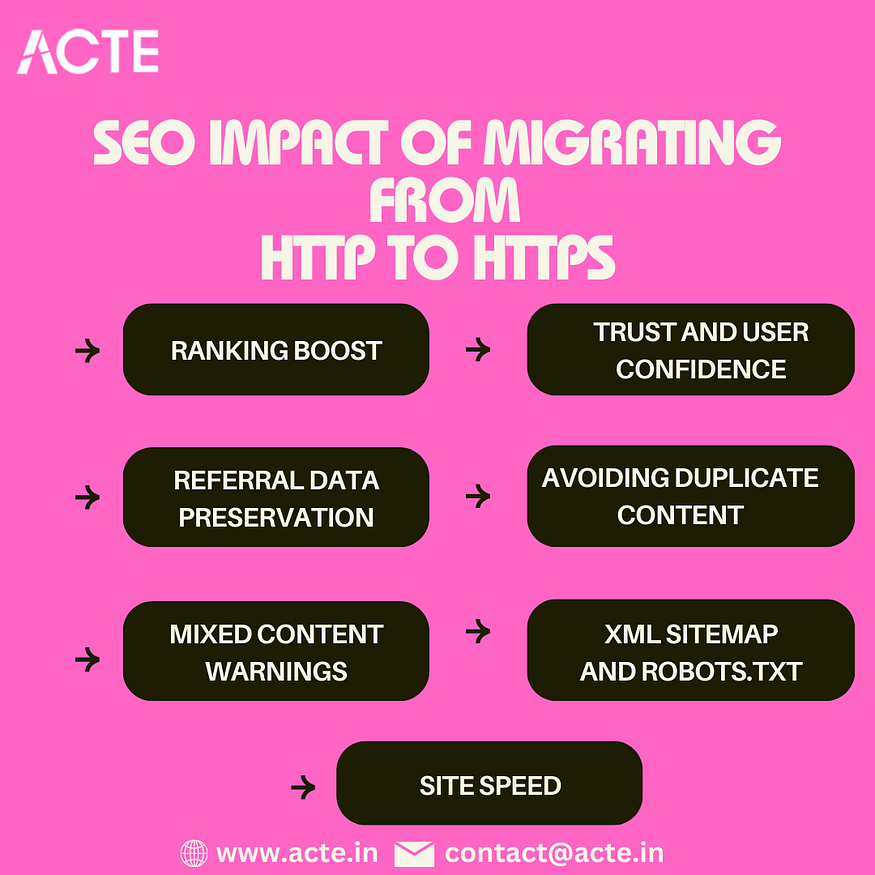The SEO Impact of Migrating from HTTP to HTTPS
In today’s digital landscape, website security is of utmost importance. Not only does it protect user data, but it also plays a role in search engine optimization (SEO). One crucial step in enhancing website security is migrating from HTTP to HTTPS.
These days, site security is becoming an increasingly important part of search engine optimization. Ever since Google announced that it was advocating for a change toward a more secure internet overall, having a safe website has been more and more important for marketers.

Well, that’s where suggested content comes into play from the Best Digital Marketing Training Institute with Placement.
We’ll explore the SEO impact of such a migration and why it’s essential for your website’s success.
Example of how the SEO impact of migrating from HTTP to HTTPS:
- Improved Search Engine Rankings:
Google has openly acknowledged that HTTPS is a ranking signal. While the impact may be subtle, migrating to HTTPS can contribute to a slight boost in search engine rankings. Google prioritizes secure browsing experiences, and using HTTPS demonstrates your commitment to website security, potentially earning you favor in search results. - Enhanced User Trust and Confidence:
HTTPS provides encryption and data integrity, ensuring secure communication between users’ browsers and your website. This heightened security helps build trust and confidence among users, leading to increased engagement, longer visit durations, and improved conversion rates. Positive user signals can indirectly impact your SEO performance. - Referral Data Preservation:
During the migration process, it’s crucial to implement 301 redirects from HTTP to HTTPS. This ensures that referral data, such as the website a user came from, is preserved. By maintaining accurate tracking of traffic sources, you can make informed decisions about your marketing strategies and optimize your website accordingly.

4. Prevention of Duplicate Content Issues:
Migrating to HTTPS requires redirecting all HTTP URLs to their corresponding HTTPS versions using 301 redirects. This consolidation helps prevent duplicate content issues that can arise when both HTTP and HTTPS versions coexist. Search engines may treat them as separate entities, potentially diluting your SEO efforts. By migrating to HTTPS, you consolidate your website’s authority and avoid content duplication.
5. Elimination of Mixed Content Warnings:
To ensure a seamless transition, it’s crucial to update all internal links, including images, scripts, and other resources, to use HTTPS URLs. Neglecting this step may result in “mixed content warnings,” where some components are served over HTTP on an HTTPS page. These warnings harm user experience and can negatively impact your SEO efforts. By ensuring all resources are served securely, you provide a consistent and trustworthy browsing experience.
6. Considerations for Site Speed:
While HTTPS encryption adds a slight overhead to page load times, the impact is usually minimal and can be mitigated through best practices. Implementing technologies like HTTP/2 and optimizing server configurations can help maintain optimal site speed. It’s important to note that the SEO benefits of HTTPS typically outweigh the minor performance impact.
7. XML Sitemap and Robots.txt Updates:
After migrating to HTTPS, make sure to update your XML sitemap and robots.txt file to reflect the new HTTPS URLs. This ensures search engines understand the changes and properly index your HTTPS pages, allowing them to be discovered and ranked appropriately.
If you want to learn more about Digital Marketing I will Highly recommend the best digital marketing course with certification.
Migrating from HTTP to HTTPS offers numerous SEO benefits that should not be overlooked. By improving search engine rankings, enhancing user trust, preserving referral data, eliminating duplicate content issues, and addressing mixed content warnings, your website can experience improved visibility and engagement.
Moreover, adopting HTTPS demonstrates your commitment to security and user privacy, which can positively impact both SEO and user satisfaction.
Remember, a smooth and well-executed migration is crucial. Carefully follow best practices, ensure proper redirects, and update all necessary resources to enjoy the SEO advantages of HTTPS while reinforcing the security of your website.

Comments
Post a Comment